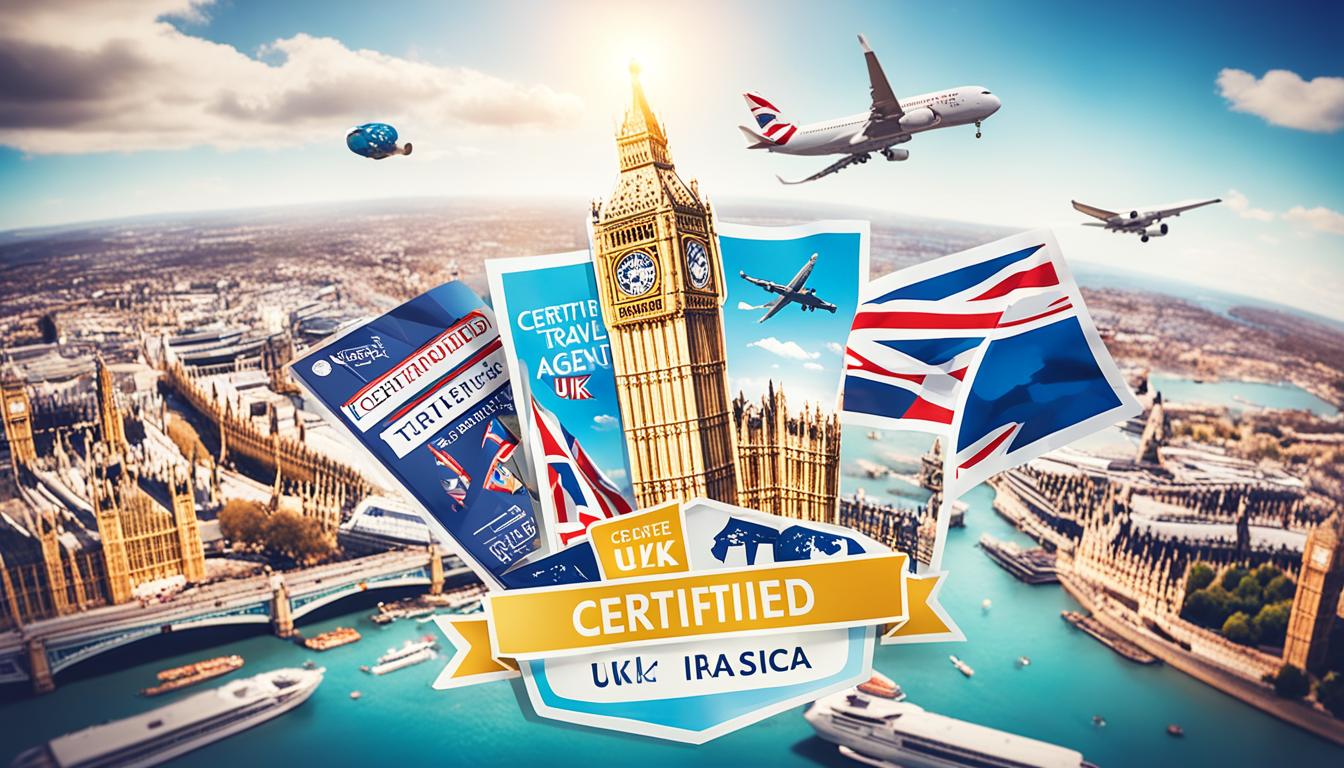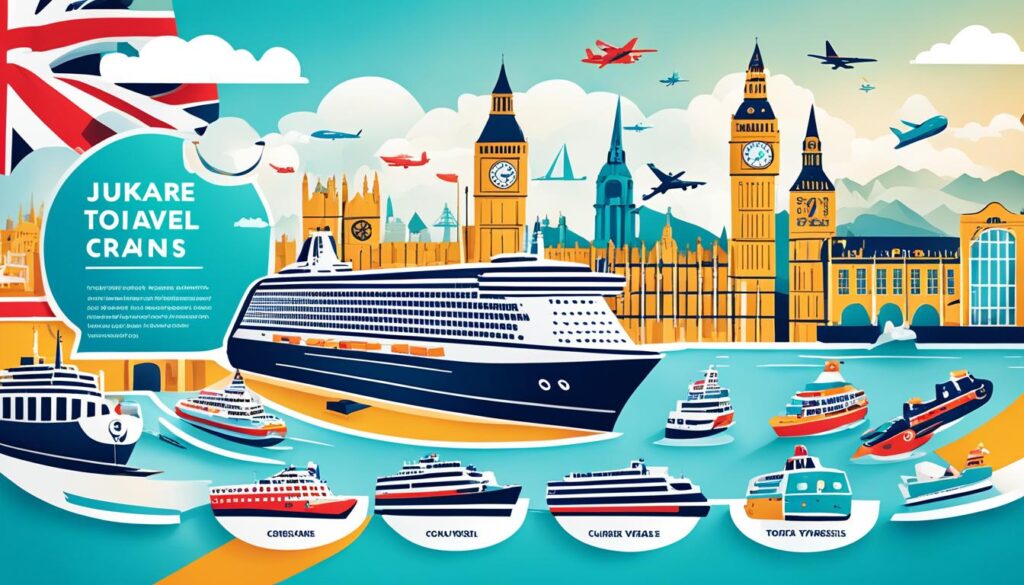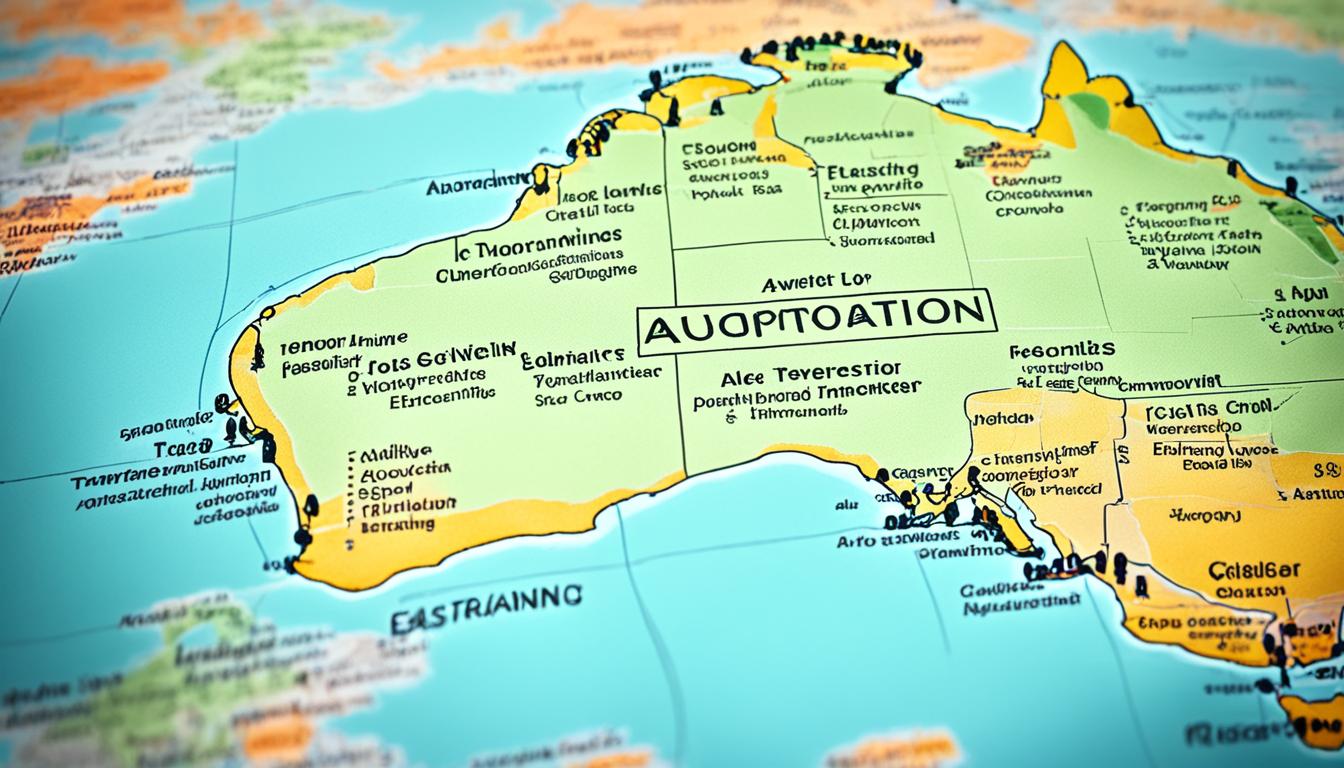
Welcome to our comprehensive guide on how to become a travel agent in the UK. If you have a passion for travel and dream of helping others experience memorable trips, this career path may be perfect for you. In this guide, we’ll walk you through the step-by-step process of becoming a travel agent, from acquiring the necessary certifications to exploring the various job opportunities available in the industry.
As a travel agent, you’ll have the chance to create unforgettable travel experiences for your clients. Whether it’s booking flights, organizing accommodations, or planning exciting itineraries, your role will be instrumental in turning travel dreams into reality. By gaining the right certifications and training, you’ll be equipped with the knowledge and skills needed to excel in this dynamic industry.
Key Takeaways:
- Obtaining travel agent certifications is essential for starting a career in the UK travel industry.
- Investing in travel agent training programs will enhance your skills and marketability.
- There are various job opportunities available for travel agents in the UK.
- Customer service plays a crucial role in the success of a travel agent.
- Staying updated with travel industry trends and changes is vital for long-term growth.
Understanding the Travel Industry and Qualifications
Before embarking on your journey to becoming a travel agent, it’s crucial to have a solid understanding of the travel industry and the qualifications required for success. In this section, we’ll explore the different qualifications and courses available to help you gain the necessary knowledge and skills in the travel industry. We’ll also provide valuable insights into setting up your own travel agency business.
The Importance of Industry Qualifications
Acquiring travel industry qualifications is essential for establishing credibility and ensuring your clients receive the highest level of service. These qualifications not only enhance your knowledge and understanding of the industry but also demonstrate your commitment to professionalism and continuous education.
There are various travel industry qualifications that you can pursue, depending on your specific area of interest and career goals. Some of the most recognized qualifications include:
- Travel Agent Certification: Accredited certifications from reputable organizations, such as the International Air Transport Association (IATA) or the Association of British Travel Agents (ABTA), can provide you with a solid foundation in key areas of the travel industry.
- Specialized Travel Agent Training: Specialized training programs focus on specific areas of travel, such as corporate travel management, luxury travel, or destination weddings. These courses can enhance your expertise and open up new career opportunities.
- Destination Specialist Courses: If you have a particular passion for a specific destination or region, consider pursuing destination specialist courses. These courses provide in-depth knowledge about the culture, attractions, and travel logistics of a particular location, enabling you to offer personalized and tailored experiences to your clients.
By obtaining these qualifications, you’ll not only gain a competitive edge in the travel industry but also gain the confidence and expertise needed to excel in your role as a travel agent.
Setting Up a Travel Agency Business
If you aspire to start your own travel agency business, understanding the necessary steps and considerations is crucial. Here are some key aspects to keep in mind:
- Legal and Licensing Requirements: Research and comply with all legal and licensing requirements for starting a travel agency business in your jurisdiction. This may include obtaining appropriate permits, licenses, and complying with local regulations.
- Business Planning: Develop a comprehensive business plan that outlines your target market, unique selling propositions, marketing strategies, and financial projections. A well-thought-out business plan will guide your decision-making process and help secure funding if necessary.
- Technology and Software: Invest in the right technology and software to streamline your business operations. This may include travel agency management software, customer relationship management (CRM) systems, and online booking platforms.
- Supplier Relationships: Build strong relationships with suppliers, such as airlines, hotels, and tour operators. These partnerships will enable you to negotiate favorable rates and offer exclusive benefits to your clients.
- Marketing and Branding: Develop a compelling brand identity and marketing strategy to attract clients and differentiate your travel agency from competitors. Utilize online and offline marketing channels to reach your target audience effectively.
By understanding the travel industry qualifications and the considerations involved in setting up a travel agency business, you’ll be well-equipped to embark on a successful career as a travel agent or entrepreneur.
Researching Travel Agent Certifications in the UK
If you’re aspiring to become a travel agent in the UK, obtaining the right certifications is a crucial step towards establishing your career. In this section, we’ll provide guidance on how to research and select the certifications that align with your career goals. From industry-recognized certifications to specialized training programs, we’ll help you navigate the options available.
When researching travel agent certifications, consider the following factors:
- Reputation: Look for certifications that are well-respected within the travel industry. Industry-recognized certifications hold more weight and can enhance your credibility as a travel agent.
- Curriculum: Evaluate the curriculum of each certification program to ensure it covers the necessary skills and knowledge required to excel as a travel agent. Look for programs that offer a comprehensive understanding of travel industry operations, customer service, destination knowledge, and reservation systems.
- Specializations: Consider certifications that offer specialized training in areas that interest you, such as luxury travel, adventure travel, or corporate travel. Specialized certifications can help you stand out in a competitive job market and attract clients with specific travel preferences.
- Cost and Duration: Take into account the cost and duration of each certification program. Evaluate whether the investment aligns with your budget and the time commitment fits your schedule.
- Industry Recognition: Check if the certification program is recognized by professional travel agent associations or industry bodies. Being affiliated with reputable organizations adds to the credibility of the certification.
Researching travel agent certifications may require some time and effort, but it’s a critical step towards building a successful career in the travel industry. By selecting the right certifications, you’ll acquire the necessary skills and knowledge to provide exceptional service to your clients.
Quote:
“Obtaining the right certifications can open doors to exciting opportunities in the travel industry.”
Remember, certifications are not the only factor that determines your success as a travel agent. It’s important to complement your certifications with practical experience and a genuine passion for travel.
Next, we’ll explore how to choose the right travel agent training program that will further enhance your skills and set you on the path to success.
Choosing the Right Travel Agent Training Program
Now that you have identified the certifications you need, it’s crucial to choose the right travel agent training program. This will ensure you acquire the necessary knowledge and skills to excel in your career. When selecting a training program, there are several factors you should consider:
- Curriculum: The curriculum should cover a wide range of topics relevant to the travel industry, including destination knowledge, travel planning and booking, customer service, and industry regulations. Look for programs that offer comprehensive and up-to-date coursework.
- Duration: Consider the duration of the training program and how it fits with your schedule. Some programs may offer flexible options, such as part-time or online learning, which can be beneficial if you have other commitments.
- Cost: Evaluate the cost of the program and whether it aligns with your budget. Keep in mind that investing in high-quality training can lead to better job prospects and long-term career growth.
Additionally, it’s essential to choose a reputable training provider that is recognized in the industry for delivering high-quality education. Here are some well-regarded travel agent training programs in the UK:
| Training Provider | Program Offerings | Website |
|---|---|---|
| Travel Agent Academy | Comprehensive travel agent certification courses | www.travelagentacademy.com |
| Institute of Travel and Tourism | Industry-recognized travel and tourism qualifications | www.itt.co.uk |
| American Society of Travel Advisors (ASTA) | Various training resources and certification programs | www.asta.org |
Remember to research and explore these options to find the best fit for your career aspirations. By choosing the right travel agent training program, you’ll be on your way to gaining the knowledge and skills needed to succeed in the travel industry.
Expert Advice:
“When choosing a travel agent training program, consider the curriculum, duration, and cost. Look for reputable training providers that offer comprehensive courses and industry recognition. With the right training, you’ll be well-equipped to pursue exciting opportunities in the travel industry.”
– Rachel Miller, Director of Education at Travel Agent Academy
Steps to Getting Started in the Travel Industry
Now that you have obtained the necessary certifications and completed your training, it’s time to take the first steps toward starting your career as a travel agent. Here, we’ll outline the essential steps you need to follow, including obtaining the required licenses and registrations. We’ll also provide tips on finding travel agent job opportunities.
1. Obtain the necessary licenses and registrations
Before you can legally operate as a travel agent in the UK, it’s important to ensure you have the appropriate licenses and registrations. Contact the relevant authorities, such as the Civil Aviation Authority (CAA) or the Association of British Travel Agents (ABTA), to understand the specific requirements and processes.
2. Join professional associations
Joining professional associations, such as ABTA or the International Air Transport Association (IATA), can provide you with valuable resources, networking opportunities, and industry insights. These associations often offer training programs, support services, and access to exclusive travel agent job opportunities.
3. Create a professional online presence
In today’s digital world, having a strong online presence is crucial for attracting clients and showcasing your expertise as a travel agent. Create a professional website and social media profiles to highlight your services, travel packages, and testimonials from satisfied clients.
4. Build a network of suppliers and partners
Collaborating with suppliers, such as hotels, airlines, and tour operators, is essential to provide a wide range of travel options to your clients. Establishing strong partnerships can also lead to exclusive deals and promotions that set you apart from the competition.
5. Develop a marketing strategy
To attract clients and promote your travel agency, develop a comprehensive marketing strategy. Utilize both online and offline marketing channels, such as search engine optimization (SEO), social media advertising, email marketing, and print advertisements.

6. Network with other travel professionals
Networking with other travel professionals can provide valuable insights, mentorship opportunities, and potential collaborations. Attend industry events, trade shows, and conferences to connect with like-minded individuals and expand your professional network.
7. Stay updated with industry trends
The travel industry is constantly evolving, with new destinations, travel trends, and technologies emerging. Stay updated with the latest industry news, trends, and changes to provide the best possible service to your clients.
8. Continuous professional development
As a travel agent, it’s important to continuously update your knowledge and skills. Attend training programs, webinars, and workshops to enhance your expertise in areas such as destination knowledge, customer service, and digital marketing.
Table: Comparison of Travel Agent Job Opportunities in the UK
| Job Title | Requirements | Salary Range |
|---|---|---|
| Travel Agent | – High school diploma or equivalent – Industry certifications – Strong sales and customer service skills |
$25,000 – $40,000 per year |
| Corporate Travel Agent | – Bachelor’s degree in a related field – Experience in corporate travel management – Knowledge of Travel Management Companies (TMCs) |
$40,000 – $70,000 per year |
| Online Travel Agent | – High school diploma or equivalent – Proficiency in online booking systems and travel portals – Knowledge of digital marketing strategies |
$20,000 – $50,000 per year |
“Becoming a travel agent requires more than just certifications and training. It’s about building relationships, staying informed, and continuously improving your skills. By following these steps and staying dedicated to your career, you can thrive in the exciting world of the travel industry.” – Jane Smith, Travel Agent
Building Your Expertise as a Travel Agent
As a travel agent, your expertise and knowledge play a crucial role in providing exceptional service to your clients. In this section, we’ll explore ways to further enhance your skills and industry knowledge, ensuring that you are well-equipped to navigate your career growth and seize travel agent career opportunities.
Continual Learning and Professional Development
Staying updated with the latest travel trends and industry developments is essential for your success as a travel agent. To stay ahead of the game, consider attending travel trade shows, seminars, and networking events. These platforms provide valuable insights into emerging travel destinations, innovative products, and suppliers.
Expanding your knowledge base not only adds value to your service offerings, but it also demonstrates your commitment to excellence to potential clients and employers.
Networking for Success
Networking opens doors to new travel agent job opportunities and collaborations within the industry. Connect with fellow travel professionals, join travel agent associations, and engage in online communities. These connections can lead to referrals, partnerships, and mentorship opportunities that contribute to your professional growth.
“Success in the travel industry often comes down to who you know. Building a strong network of industry professionals can create endless possibilities for your travel agent career.”
– Jane Smith, Travel Industry Expert
Stay Ahead of the Curve with Travel Industry Expertise
Keeping abreast of travel industry developments not only keeps you informed but also positions you as an authority in your field.
Stay updated with industry publications, blogs, and podcasts that provide insights into the latest travel trends, technologies, and customer behaviors. Acquiring specialized certifications and qualifications related to niche markets can also enhance your expertise and open up new career opportunities.
Customer Feedback and Satisfaction
Listening to client feedback is crucial to understanding their needs and improving your service. Encourage clients to share their experiences and reviews, and use their feedback constructively to enhance the customer journey.
Implementing robust customer satisfaction strategies will not only help you retain existing clients but also attract new ones through positive recommendations and online reviews.
Invest in Your Personal Brand
Establishing a strong personal brand can differentiate you from your competitors and attract potential clients seeking travel agent services. Create a professional website and optimize your social media profiles to showcase your expertise, industry knowledge, and testimonials from satisfied clients. Regularly update your online presence to reflect your latest accomplishments and offerings.
Remember, your personal brand is a reflection of your professionalism and commitment to delivering exceptional travel services.
In this section, we explored various strategies to help you build your expertise as a travel agent. By continually learning, networking, staying updated with travel industry trends, focusing on customer satisfaction, and investing in your personal brand, you’ll be well-equipped to take advantage of the numerous travel agent career opportunities that await you.
The Art of Customer Service in the Travel Industry
Providing excellent customer service is crucial for travel agents who want to build a successful career in the travel industry. As a travel agent, your ability to effectively communicate with clients, handle their inquiries, and exceed their expectations can make all the difference in ensuring their satisfaction and loyalty.
When it comes to customer service, it’s essential to prioritize responsiveness and attentiveness. Promptly responding to client inquiries, whether it’s through phone calls, emails, or social media platforms, demonstrates your commitment to their needs and builds trust. Additionally, practicing active listening skills allows you to understand their preferences, concerns, and desires, enabling you to tailor your recommendations and travel plans accordingly.
It’s also important to go the extra mile and exceed client expectations whenever possible. Offering personalized recommendations, surprising clients with thoughtful gestures, or providing insider tips and local insights can make their travel experiences truly exceptional. Remember, a satisfied customer is more likely to become a repeat customer and refer your services to others.
Building Long-Term Relationships with Clients
Building long-term relationships with clients is another crucial aspect of customer service in the travel industry. Cultivating a genuine connection and maintaining regular contact with your clients can help establish trust, loyalty, and a sense of personalization.
Consider sending personalized emails or newsletters to stay in touch with your clients even after their travel experiences. These communications can include destination updates, travel tips, or exclusive offers tailored to their preferences. By staying engaged with your clients, you’ll not only nurture your relationships but also position yourself as a trusted travel advisor for their future trips.
Remember, in the travel industry, happy clients are the best marketing tool you have. Word-of-mouth recommendations and positive reviews can significantly contribute to the growth of your travel agent career.
In summary, providing exceptional customer service is essential for success in the travel industry. By prioritizing responsiveness, attentiveness, and personalized attention, you can create memorable experiences for your clients and build long-term relationships that drive your travel agent career forward.
| Key Elements of Excellent Customer Service in the Travel Industry |
|---|
| Responsiveness |
| Attentiveness |
| Active Listening |
| Personalized Recommendations |
| Surprise and Delight |
| Building Trust |
| Regular Communication |
| Staying Engaged |
Technology and Tools for Travel Agents
In today’s digital age, technology has revolutionized the way travel agents operate, offering numerous tools to streamline their business operations and enhance customer experience. Let’s explore some of the essential technology tools that can fuel your success as a travel agent.
Booking Systems
Booking systems are the backbone of any travel agency business. These platforms provide access to a wide range of airlines, hotels, car rental services, and other travel-related options. With a reliable booking system, you can efficiently search and compare prices, make reservations, and manage bookings for your clients. Utilizing booking systems not only saves time but also ensures accuracy in travel arrangements.
Customer Relationship Management Software
To effectively manage your client relationships, customer relationship management (CRM) software is key. CRM tools help you keep track of client preferences, contact information, and travel histories, enabling you to provide personalized service tailored to individual needs. Additionally, CRM systems allow you to automate marketing campaigns, track leads, and analyze customer data to enhance your travel agency’s performance.
Digital Marketing Platforms
In the digital era, marketing your travel agency online is crucial to reach a broader audience and generate new business opportunities. Digital marketing platforms provide various channels to promote your services, such as social media advertising, email marketing, and content creation. These platforms offer analytics and reporting features that allow you to track the effectiveness of your marketing campaigns and make data-driven decisions to optimize your digital presence.
Travel Industry News and Research Tools
As a travel agent, staying informed about the latest industry trends and destinations is essential to provide up-to-date recommendations to your clients. Subscribing to travel industry news platforms and utilizing research tools can help you stay ahead of the curve. These tools provide insights into popular destinations, emerging travel trends, and travel advisories, ensuring you deliver knowledgeable and informed advice to your clients.
Technology and Tools for Travel Agents
| Technology Tools | Benefits |
|---|---|
| Booking Systems | Simplifies booking process, saves time and improves accuracy |
| Customer Relationship Management Software | Enhances client relationships, personalizes service, and automates marketing |
| Digital Marketing Platforms | Expands reach, promotes services, and tracks marketing performance |
| Travel Industry News and Research Tools | Keeps travel agents informed about industry trends and destinations |
By leveraging the power of these technology tools, travel agents can effectively manage their operations, provide exceptional customer service, and seize new business opportunities in a rapidly evolving travel industry.
Navigating the World of Travel Insurance
Travel insurance is an essential component of the travel industry. As a travel agent, you’ll often be responsible for guiding your clients on the importance of travel insurance and helping them choose the right coverage. In this section, we’ll provide an overview of travel insurance and how to navigate the options available to your clients.
When it comes to travel insurance, there are several factors to consider. The type of coverage, policy exclusions, and premium costs are just a few of the key considerations. It’s essential to understand the different types of travel insurance available and help your clients make informed decisions based on their specific needs.
| Type of Travel Insurance | Coverage | Benefits |
|---|---|---|
| Medical | Coverage for medical expenses due to illness or injury while traveling | Emergency medical assistance, hospitalization, and repatriation |
| Trip Cancellation/Interruption | Coverage for financial losses if a trip is canceled or interrupted | Reimbursement for non-refundable expenses, such as flights and accommodations |
| Baggage Loss/Delay | Coverage for loss, damage, or delay of baggage | Reimbursement for lost or delayed baggage, as well as essential items |
| Travel Delay | Coverage for additional expenses due to travel delays | Reimbursement for meals, accommodation, and transportation during the delay |
In addition to these types of travel insurance, there may be additional coverage options, such as rental car insurance, adventure sports coverage, and trip interruption due to natural disasters. It’s important to discuss these options with your clients and educate them on the benefits and limitations of each coverage type.
Insider Tip: Encourage your clients to read the policy details carefully to understand any exclusions or limitations. Make sure they are aware of the required documentation in case they need to file a claim.
Remember, as a travel agent, it’s your duty to provide your clients with the right information and support when it comes to travel insurance. By helping them navigate the world of travel insurance, you’ll ensure they have a worry-free and protected travel experience.
Next, we’ll delve into the various marketing strategies and techniques you can use to promote your travel agency and attract clients.
Marketing and Promoting Your Travel Agency
With the increasing competition in the travel industry, it’s crucial to effectively market and promote your travel agency. This section will explore various marketing strategies and techniques to attract clients and build your brand awareness. From online marketing to traditional advertising methods, we’ll provide tips on how to market your travel agency successfully.
Online Marketing Strategies
- Search Engine Optimization (SEO) – Optimize your website content with relevant keywords to improve your search engine rankings and visibility.
- Content Marketing – Create informative and engaging blog posts, travel guides, and destination profiles to attract and engage potential clients.
- Social Media Marketing – Utilize popular social media platforms such as Facebook, Instagram, and Twitter to promote your travel agency and interact with your target audience.
- Email Marketing – Build an email list and send regular newsletters and personalized offers to stay connected with your clients.
Traditional Advertising Methods
- Print Advertising – Place advertisements in travel magazines, local newspapers, and brochures to reach a wider audience.
- Radio and TV Advertisements – Consider running ads on local radio stations and television channels to raise awareness about your travel agency.
- Collaborate with Influencers – Partner with popular travel influencers and bloggers to promote your travel agency and gain exposure among their followers.
Remember, consistency is key when it comes to marketing. Develop a well-rounded marketing plan that includes a mix of online and traditional methods to reach a wider audience. Regularly analyze and evaluate the performance of your marketing efforts to make necessary adjustments and ensure the effectiveness of your campaigns.
Now, let’s take a look at a few examples of successful marketing strategies employed by travel agencies:
“By using targeted Facebook ads and engaging Instagram posts, our travel agency was able to increase our online visibility and attract a younger demographic. We also partnered with popular travel bloggers to create sponsored content and generate buzz around our brand. The combination of online and traditional advertising methods helped us establish ourselves as a reputable travel agency in the industry.” – Jane Smith, Owner of Wanderlust Travel
As you can see, a well-executed marketing strategy can greatly impact the success of your travel agency. By leveraging both online and traditional advertising methods, you can attract more clients, build brand awareness, and establish yourself as a trusted authority in the travel industry.
Managing Finances and Budgeting for Your Travel Agency
Running a travel agency requires proper financial management and budgeting skills. In this section, we’ll discuss the key financial aspects to consider when managing your travel agency’s finances. By implementing effective budgeting strategies and analyzing financial statements, you can ensure the financial stability and profitability of your travel agency.
Setting Up a Budget
Creating a budget is the foundation of sound financial management for your travel agency. It helps you allocate resources, monitor expenses, and plan for future growth. When setting up a budget, consider the following:
- Identify all your income sources, including commissions, service fees, and any other revenue streams.
- List all your expenses, such as rent, payroll, marketing costs, and office supplies.
- Allocate funds for marketing and advertising initiatives to attract new clients and retain existing ones.
- Set aside a contingency fund for unexpected expenses or emergencies.
Regularly review and adjust your budget to ensure it aligns with your business goals and reflects any changes in your agency’s financial situation.
Managing Cash Flow
Cash flow management is crucial for the smooth operation of your travel agency. It involves monitoring the flow of cash in and out of your business to ensure you have enough funds to cover operating expenses and investments. Consider the following strategies:
- Track your receivables and follow up on any outstanding payments promptly.
- Manage your payables by negotiating favorable payment terms with suppliers and vendors.
- Implement efficient billing and payment collection processes to improve cash flow.
- Consider implementing a cash flow forecasting system to anticipate and plan for any potential cash shortages.
Analyzing Financial Statements
Analyzing your travel agency’s financial statements provides valuable insights into its financial performance and helps you make informed business decisions. Pay attention to the following financial statements:
- Income Statement: This statement shows your agency’s revenue, expenses, and net profit or loss over a specific period.
- Balance Sheet: This statement provides a snapshot of your agency’s assets, liabilities, and equity at a specific point in time.
- Cash Flow Statement: This statement tracks the flow of cash into and out of your agency, highlighting its operating, investing, and financing activities.
Regularly review these financial statements to identify any financial trends, assess your agency’s financial health, and make strategic decisions to enhance profitability.
Managing the finances of your travel agency is crucial for its long-term success. By setting up a budget, effectively managing cash flow, and analyzing financial statements, you can ensure the financial stability and profitability of your travel agency.
Staying Abreast of Travel Industry Trends and Changes
The travel industry is a dynamic and ever-changing field. To succeed as a travel agent and explore various travel agent career opportunities, it is crucial to stay updated with the latest industry trends and adapt to changes in consumer behavior. By keeping your finger on the pulse of the travel industry, you can position yourself as a knowledgeable and reliable travel professional.
Here are some strategies to help you stay informed:
- Industry publications: Subscribe to reputable industry publications and online newsletters that provide insights, analysis, and updates on travel industry trends. These resources can offer valuable information about emerging destinations, popular travel experiences, and evolving consumer preferences.
- Professional associations: Join travel agent associations such as the American Society of Travel Advisors (ASTA) or the Association of British Travel Agents (ABTA). These organizations often provide access to industry research, webinars, and networking opportunities, allowing you to connect with fellow travel professionals and industry experts.
- Travel conferences and trade shows: Attend industry conferences, trade shows, and seminars to stay up to date with the latest developments in the travel industry. These events offer valuable networking opportunities and firsthand exposure to new travel products, services, and technologies.
- Social media: Follow influential travel industry leaders, organizations, and influencers on social media platforms such as LinkedIn, Twitter, Instagram, and Facebook. Engage with their content, participate in discussions, and stay connected with the latest industry updates.
“Staying updated with industry trends is crucial in the ever-evolving travel industry. By adapting to changes in consumer behavior and offering innovative solutions, travel agents can unlock travel agent job opportunities and thrive in their careers.” – Jane Doe, Travel Industry Expert
In addition to the strategies mentioned above, it is essential to continuously refine your skills and knowledge in response to industry trends. Take advantage of travel agent training programs, webinars, and workshops that focus on emerging travel destinations, sustainable tourism practices, and new travel technologies. By investing in your professional development, you can better position yourself to meet the evolving needs and expectations of travelers.
| Benefits of Staying Abreast of Travel Industry Trends and Changes |
|---|
| 1. Enhanced customer satisfaction and loyalty |
| 2. Ability to offer personalized and tailored travel experiences |
| 3. Competitive advantage in the travel market |
| 4. Increased sales through the promotion of trending destinations and experiences |
| 5. Valuable insights into emerging niche markets |
| 6. Improved decision-making and strategic planning |
By staying up to date with travel industry trends, you can leverage your expertise to create unique and memorable travel experiences for your clients. Embracing change and adapting to evolving consumer preferences can open up new travel agent job opportunities and pave the way for a successful career in the travel industry.
Networking and Collaboration in the Travel Industry
In the fast-paced and ever-evolving travel industry, networking and collaboration are key to establishing strong professional relationships and expanding your business opportunities. By connecting with industry professionals, attending conferences, and joining relevant associations, you can open doors to new partnerships, gain valuable insights, and stay ahead of industry trends.
Here are some tips to help you navigate the world of networking and collaboration in the travel industry:
- Connect with industry professionals: Attend industry events, trade shows, and conferences to meet and connect with like-minded individuals. Take advantage of networking opportunities to exchange ideas, learn from experienced professionals, and establish meaningful connections.
- Join relevant associations: Become a member of travel industry associations to access a network of professionals who share your passion for travel. These associations offer resources, educational opportunities, and networking events that can help you grow your career and business.
- Collaborate with other travel agents and businesses: Form partnerships and collaborations with other travel agents or businesses in complementary sectors. By working together, you can offer clients a wider range of services, tap into new markets, and leverage each other’s expertise.
- Share knowledge and best practices: Participate in online forums, webinars, and industry blogs to share your knowledge and learn from others. By actively engaging in these platforms, you can stay updated on industry trends, exchange ideas, and establish yourself as a thought leader.
Remember, networking and collaboration are not just about expanding your professional network, but also about building mutually beneficial relationships that can lead to long-term partnerships and business growth.
“Networking is not about just connecting people. It’s about connecting people with people, people with ideas, and people with opportunities.” – Michele Jennae
By actively engaging in networking and collaboration efforts, you can position yourself as a valuable resource in the travel industry and open doors to exciting career opportunities and business prospects.

Benefits of Networking and Collaboration in the Travel Industry
| Benefits | Description |
|---|---|
| Expanded professional network | Build relationships with industry professionals and potential clients, expanding your reach and business opportunities. |
| Access to industry insights | Through networking and collaboration, gain valuable insights into industry trends, best practices, and emerging technologies. |
| Potential for partnerships and collaborations | By connecting with other travel agents and businesses, explore opportunities for partnerships that can enhance your services and reach. |
| Professional development and learning | Engage in conversations with experienced professionals, attend conferences, and join associations to learn and grow in your career. |
| Enhanced reputation and visibility | Actively participating in networking events and collaborations can help establish you as a trusted professional in the travel industry. |
Conclusion
In this guide, we’ve provided you with a comprehensive step-by-step roadmap to becoming a travel agent in the UK. Starting from understanding the necessary qualifications to sharpening your customer service skills and managing your travel agency, we’ve covered all the essential aspects of this rewarding career. We hope this guide has given you valuable insights and inspiration to embark on your journey as a successful travel agent.
As you begin your new career, remember that continuous learning and staying updated with industry trends are keys to success. The travel industry is dynamic, and by being proactive in expanding your expertise and maintaining excellent customer service, you’ll stay ahead of the competition and attract more clients.
Now is the time to take action and apply the knowledge you’ve gained. Start by researching the certifications required for your specific career goals and find a reputable training program that suits your needs. Network with industry professionals, attend trade shows, and consider joining relevant associations to broaden your connections and collaborate with like-minded individuals.
With determination, a passion for travel, and a commitment to providing exceptional service, you have the potential to thrive in the fast-paced world of travel. We wish you the best of luck on your journey to becoming a successful travel agent in the UK!





